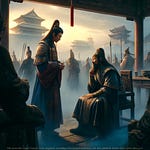The art of war, then, is governed by five constant factors, to be taken into account in one's deliberations, when seeking to determine the conditions obtaining in the field. These are:(1) The Moral Law;(2) Heaven;(3) Earth;(4) The Commander;(5) Method and discipline. (Derived from "The Art of War" by Sun Tzu, the “Laying Plans” chapter.)
Regarding decision-making in war, it is imperative to "Hence it is a subject of inquiry which can on no account be neglected," emphasizing the need for meticulous inspection and in-depth research. Although this concept is easy to articulate, it is somewhat challenging to implement. When facing war, rulers and generals have numerous considerations, described as myriad and complex, not something that can be addressed all at once. Sun Tzu offered a solution: "The art of war, then, is governed by five constant factors, to be taken into account in one's deliberations, when seeking to determine the conditions obtaining in the field."
"The art of war is governed by five constant factors" refers to analyzing and comparing the situation of both the enemy and oneself from five aspects: (1) the Moral Law;(2) Heaven;(3) Earth;(4) the Commander;(5) Method and discipline. These aspects include the people's support, climate conditions, geographical situation, the ability of commanders, and management laws. Sun Tzu believed that these factors are the fundamental pillars of a state's and an army's strength, as well as the key elements in determining the outcome of a war. By comparing the situations of the opposing sides in these five areas, it becomes clear who is stronger or weaker, and who is superior or inferior, thereby enabling correct decision-making. Many important historical dialogues between monarchs and ministers in ancient China unfolded according to Sun Tzu's analytical method, laying the foundation for military strategies that influenced the course of history. The most representative of these is the "Longzhong Dialog," a conversation between Liu Bei and Zhuge Liang during the late Eastern Han dynasty.
The "Longzhong Dialog" took place in the 12th year of Jian'an, when Liu Bei visited Zhuge Liang three times at his thatched cottage. Zhuge Liang was moved by Liu Bei's sincerity and agreed to meet him on his third visit. Liu Bei told Zhuge Liang, "The Han Dynasty is now in chaos, with traitors in power and the emperor forced to flee. Despite my limited abilities, I wanted to fight for justice for the people, but I failed due to my lack of wisdom and strategy. My ambition has not faded, and I still hope to restore the Han Dynasty. What do you think I should do?"
Zhuge Liang already knew why Liu Bei had come and analyzed the overall situation and the state of the various factions from four aspects. First, Zhuge Liang analyzed Liu Bei's main rival, Cao Cao. He noted that Cao Cao had defeated Yuan Shao, commanded an army of a million, and, by controlling the emperor, could order the princes around. With strong military forces and political advantages, Cao Cao was indeed not someone to confront directly.
Next, Zhuge Liang analyzed Liu Bei's secondary rival, Sun Quan. He thought that Sun Quan, who controlled Jiangdong (including Wu, Kuaiji, Yuzhang and Danyang counties), had a strategic location and the support of the people. He also appointed talented individuals, so he could only be relied on as external support, but not attacked.
Zhuge Liang then analyzed territories Liu Bei could potentially seize: Jingzhou and Yizhou. He believed Jingzhou, bordered by the great river to the north and connected to Wu and Kuaiji counties to the east, and Ba and Shu counties to the west, was a strategically vital area that was easily accessible. However, its ruler, Liu Biao, was incapable of defending it, suggesting it was almost destined to support Liu Bei. Yizhou, with its treacherous terrain, fertile land, and superior natural conditions, was where Liu Bang, the founding emperor of the Han dynasty, established his empire. Its current ruler, Liu Zhang, was incompetent, and despite the region's wealth, he failed to cherish it. The people of Yizhou longed for a wise ruler. Did General Liu consider taking over Jingzhou and Yizhou?
Finally, Zhuge Liang analyzed Liu Bei's own situation. He believed that although General Liu was not as powerful as Cao Cao or Sun Quan, he had two major advantages: firstly, as a descendant of the royal family, he had high prestige and was renowned throughout the land; secondly, General Liu was known for attracting heroes and valuing talent, which won him the hearts of many. With these advantages, if planned properly, General Liu could still seize control of the empire.
After hearing Zhuge Liang's analysis, Liu Bei became very excited and asked how exactly the plan should be implemented. Zhuge Liang, after a moment of thought, laid out the famous three-step strategy: First, take control of Jingzhou and Yizhou and secure strategic locations as a base. Second, pacify the ethnic minorities in Jingzhou and Yizhou, ally with Sun Quan externally, and reform politics internally. Third, wait for an opportune moment, such as a major internal conflict within Cao Cao's faction, to launch an attack from Jingzhou with one of his top generals while Liu Bei personally leads another attack from Yizhou. The two forces would then converge on Cao Cao. If executed as planned, seizing the empire could be successful.
After hearing this, Liu Bei praised the strategy enthusiastically. Later, by following this strategic plan, he successfully established his own kingdom, creating a three-way split of the realm alongside Cao Cao and Sun Quan. Zhuge Liang's analysis clearly followed the principles of Sun Tzu's "The art of war is governed by five constant factors" - people's support, climate conditions, geographical situation, the ability of commanders, and management laws. He briefly analyzed and compared the situation of each faction in these aspects, leading to the correct strategic decision.










Share this post